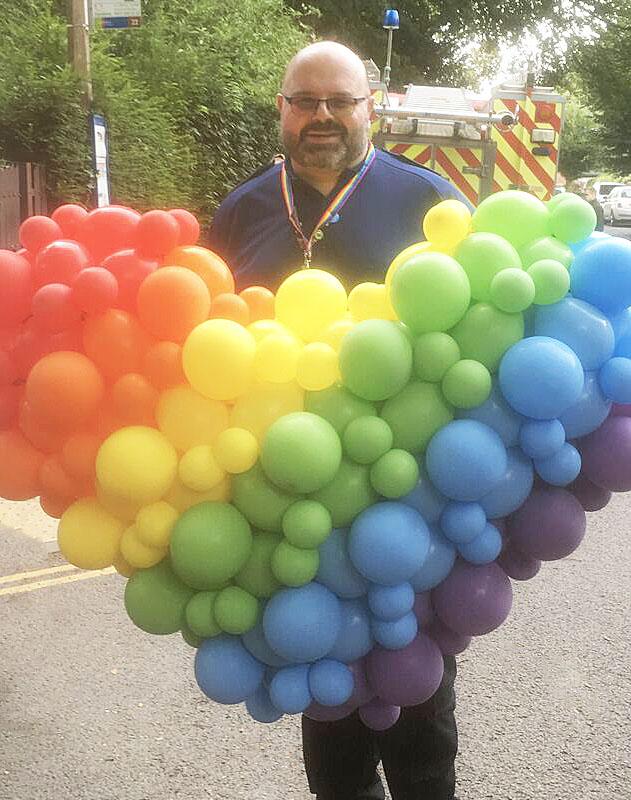by Damon Williams
Detective Superintendent | Metropolitan Police Service
Many of you will have read the blog by Suzanne Burke – from the comments so far on the Met Police intranet, it struck a chord with a lot of people. And, as Suzanne’s line manager for the last 18 months or so, I find myself entirely unjustifiably proud of her for writing it!

Anyway, I thought I might share some of my experience learning – or at least starting to learn – to manage an autistic staff member. I hope that my tips might be useful to those of you who do, or will one day, manage someone who is autistic.
I should start by confessing that I’ve been very lucky. I recruited Suzanne at a point when she had already been diagnosed, and she had taken the decision to be completely open about her autism. In short, she’s always been willing to teach me how to manage Suzanne!
My ‘learning journey’ (as we call it these days) began before I even met Suzanne. After she passed the recruitment paper sift, HR contacted me and told me that Suzanne was autistic and I should consider making some adjustments to the interview process. A quick Google search led me to the National Autistic Society (NAS) website and a wealth of information about the condition. This paragraph, in particular, caught my attention:
“…autistic candidates often demonstrate above-average skills in some or all of the following areas: high levels of concentration; reliability, conscientiousness and persistence; accuracy, close attention to detail and the ability to identify errors; technical ability, such as in IT; detailed factual knowledge; and an excellent memory.”
“Well”, I thought, “Who doesn’t want those attributes in their staff?” So, armed with my new-found knowledge, I was suitably equipped to consider some ‘reasonable adjustments’ and tweak the interview process to make sure Suzanne was comfortable and give her the chance to do her best. This brings me to some tips that have found particularly useful that may help others:
Tip 1: Educate yourself
A little time invested researching the condition really helped me understand which bits of a traditional interview and assessment process might be harder for someone with autism and why, meaning I could adapt to make it fair.
Suzanne (as you’ll have guessed) was most impressive in the interview and got the job. And, once she started working for me, we had a number of conversations about her autism – nothing formal, just me getting to know her and starting to work out how I could get the most out of her. This brings me to…
Tip 2: Make time to get to know your staff member
If you followed Tip 1 you’ll have found out about quite a number of typical autistic traits – but every autistic person is unique, and you need to understand them as an individual to manage them effectively.
To be honest, I think Tip 2 is my best one. It should probably be the only tip, but it would be a short blog and I like the sound of my own voice so I’m not stopping now. All the other advice I have follows from Tip 2…
Tip 3: Adapt your approach
Remember that it’s your job as a manager to adapt your style to suit the individual you’re managing to get the best out of them. If you manage everyone the same way, you’re almost certainly getting it wrong for most of them. Certainly, when you manage a person with autism, they’re likely to need something a bit different from you. If they do, it’s up to you to change, not them!
Tip 4: Set clear expectations and give clear feedback
We all find it unsettling not knowing what’s expected of us, and autistic people are certainly no exception. Many autistic people don’t pick up on hints very well, and they won’t always be able to infer your meaning from informal instructions – so, if you want something done a certain way, just say so. If you want something done differently next time, just say so. In my experience, if you’re clear, you’ll seldom have to ask twice. It’s not a matter of ‘spoon feeding’, just providing clarity.
Tip 5: Reflect
Sun Tzu’s Art of War (an odd reference I know, but bear with me) says: “If words of command are not clear and distinct, if orders are not thoroughly understood, the general is to blame.” In my experience, if I don’t get what I want from Suzanne, it often means I didn’t ask for what I wanted. If you don’t get quite what you wanted, think about how you explained yourself. Did I explain my request clearly? Could you be clearer next time? This should probably be part of Tip 3, but I really wanted to get that Sun Tzu quote in…
And that’s me… I’m all out of tips. And I feel a bit of a fraud for such a paltry offering of advice.
But writing this got me thinking… and I’ve come to a conclusion I didn’t expect. I started this blog hoping to crystallise some valuable pearls of wisdom to pass on to help you manage an autistic staff member, or end up explaining how managing someone with autism is different but rewarding. But – and this is the unexpected bit – I don’t think managing a person with autism is different to managing anyone else.
Sure – you probably have to work a little bit harder sometimes. And maybe you need to give your approach a bit more thought. Perhaps you need to be a bit more receptive. But, in my experience, the rewards are worth a little bit of extra effort.
So here’s my final tip: whether you’re managing a person with autism or any other neurodivergent condition, remember that you’re managing an individual. If you take a little time to learn about them, adapt your style, set clear expectations and have honest dialogue about their work, you’ll not go far wrong. Additionally, and probably even more importantly, you’ll be helping to make the Met Police Service a more welcoming place for a wide range of talented and capable individuals who have a huge amount to give and often think a little differently. What’s not to like about that? ∎
This blog was originally published on the MPS intranet – it is reproduced here with kind permission of the author


